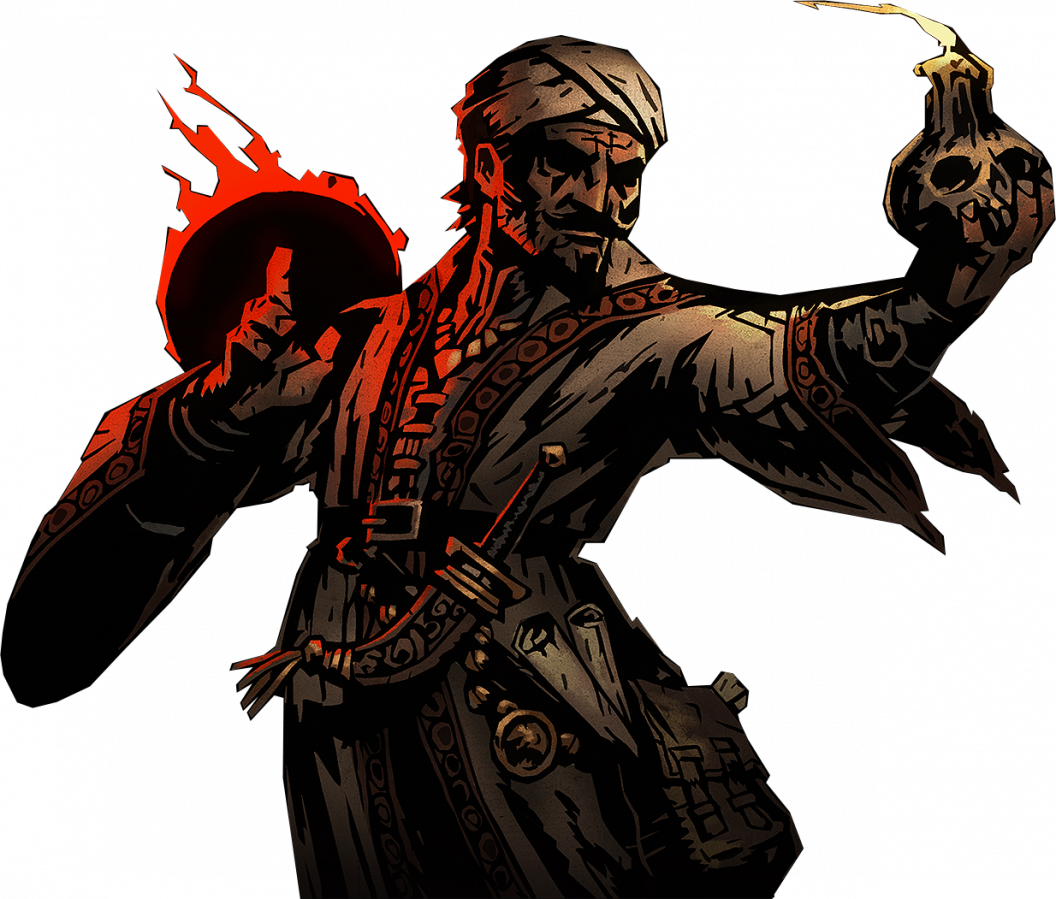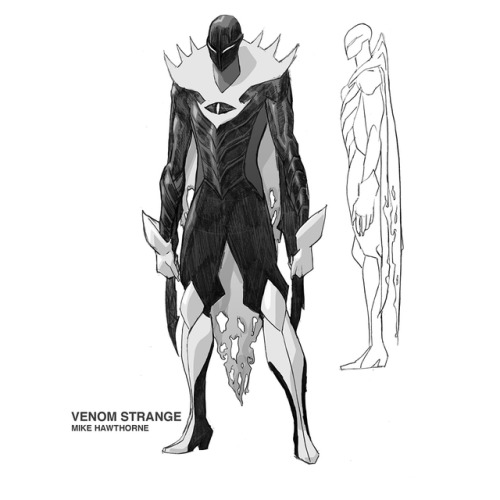 |
| Unquestionably a GLOG Wizard. The skull is probably a familiar. (Darkest Dungeon: still cool) |
So, GLOG people like Wizards. Here’s my basic template for them, rounding out my Primary Class Trio. It’s adapted primarily from this Coins and Scrolls Class.
Wizard
For every Wizard template you have, gain 1 Mana Dice (MD).
A: Wizard Features, School Features, +2 Spells Known (1-6)
B: Spell Breeding, Call Familiar, +1 Spell Known (1-8)
C: Wizard Vision, +1 Spell Known (1-10)
D: Arcane Communion, +1 Spell Known (1-10)
Wizard Features
Mana Dice (MD)
You get 1 per Wizard template. They are d6s. Whenever you cast a spell, you choose how many MD to invest into it (minimum 1). The result of the spell depends on the number of [dice] and their [sum]. If a MD rolls a 1-3, it returns to your pool to be used again. Otherwise, you lose it until you get a night of sleep. You can’t cast without MD.
Spells
They’re stored either in your mind or on scrolls/spellbooks, in “Spell Slots.” Spells stored on scrolls/spellbooks can be cast once per day. Spells stored in your mind can be cast as many times per day as you want. You can move spells between your mind and your spellbook every morning. There are two ways to acquire spells: levelling up, and stealing them from the spellbooks of other wizards.
+Spells Known
Every time you gain a Wizard template, you gain a new Mind Spell Slot and a new Spell, rolled randomly on your school list (more on that later). You start out with two Mind Spell Slots and two Spells.
Identify
By licking an object, you can tell whether or not it is magical.
School Features
Spell List
Every Wizard School has a list of 11+ spells associated with it. You roll randomly for them each time you take a Wizard template: 1d6 for the A template, 1d8 for B, and 1d10 for C and D. Later spells are Emblem spells that you must quest for.
Perk/Drawback
A passive bonus/penalty.
Cantrips
Minor magical abilities you can use as often as you like.
Mishaps/Dooms
Mishaps occur when you roll doubles on your MD. They’re potentially dangerous magic accidents. Dooms occur when you roll triples. There are three, and they occur in order. They will end your wizardly career or kill you if you don’t quest to avoid your Doom.
Level 2+ Features
Spell Breeding
With a night of work, you can breed (destroy) two spells you know or have on scrolls to learn a new spell, rolled randomly from your school spell list.
Call Familiar
You may call to a familiar, a magical spirit. The familiar will appear in 1d20 hours. You must then bargain with it for its service. They like ambition and valuable sacrifices. Roll under INT (bonus/penalty depending on bargaining); if it fails, no familiar will ever appear for you in this location again, but if it succeeds, the familiar agrees to a mutually binding magical contract. Your familiar will serve you to your last drop of ambition.
Familiars can provide a Service once/day. For each Service, you owe the familiar one Favor. They can be pretty nasty tasks, but failing to fulfill them incurs a Breach of Covenant, which are nasty for you. Everything else dealing with familiars is GM-facing. You are not required to call a familiar.
Familiar Services
- Detect Magic (for free, ask nicely)
- Teach you a new spell from your school’s spell list (1d4+1 max, first is free)
- Allow you to cast a spell from a scroll or spellbook twice in one day
- Grant you one free MD
- Exercise its unique power
- Save you from death, once
- Anything else you can think to ask of it. Just remember that it will count for a Favor.
Wizard Vision
You always see invisible things as a faint lensing of light, and can tell roughly how big they are. By making eye contact with someone, you can tell if they are possessed, undead, protected by divinity, or a spellcaster.
Arcane Communion
You can pool your MD with other wizards (including lower level and NPC wizards). Mishaps and Dooms affect all of you.
 |
| Ohoho, you thought we were done with Venom, did you? You thought WRONG! (by Mike Hawthorne) |
Design Notes
I really like to condense things. It’s fun, I think I’m good at it, and it makes things easier to understand. I’ve been condensing the wizard class since I first played the GLOG; I think this result is good.
I’m not going to talk about school design; Skerples has a good post on the subject over at Coins and Scrolls. I’m also not good at writing wizards—I don’t have any I’m happy with yet, and they’re not very high priority. I’m already spoiled for choice with existing GLOG wizards.
Now, on to the actual notes. Identify is great. It’s simple, it gives players just enough information to freak them out but not enough to help, and it encourages your wizards lick dangerous things. What’s not to love?
My system for spellcasting is sort of the opposite of Vancian casting; instead of having a limited number of more convenient memorized castings and less limited clunky book castings, my wizards can cast their “signature” memorized spells until they run out of MD and scrolls/books are for niche situations. It’s a bit more video-gamey and makes more sense to me. At some point, I might try real vancian casting, but I’m happy with this for now.
Familiars are great. Arnold says it better than I do, so if you want more detail and GM-facing information, head to his post on the subject. I’ve taken his rules and condensed them down to just the player-facing parts. Familiars hit a core theme: wizards are a class for making Poor Decisions. Free MD every day? Nice! Salvation from death? Cool! Horrible demon favors? Ye—wait, uh, what? The biggest issue with this is that I am a total wimp and I’m bad at thinking of good horrible demon favors. (Also I use CHA instead of INT for the roll since I don't have INT as a stat.)
Wizard Vision is another neat Arnold idea I’m formalizing as a wizard class ability. Arnold’s original version involves losing either WIS or CHA, but because I run with STR/DEX/CHA as the only stats and roll them with 3d6-drop-lowest, I don’t do the stat drain.
Arcane Communion is another conduit for Poor Decisions. At 4 MD, the chance for a Mishap is about 70%, and the chance for a Doom is about 10%. It’s not hard to get 8 MD with this ability and a couple first level shmucks, but—while it is very strong—it's also a colossally stupid idea since they’ll all have sparks shooting out of their eyes as the magic goes haywire. It’s perfect. As a side note, Monsieur’s Witch foundation has this ability at first level, but since I find it a bit complex for my tastes, I just decided to move it here.
Wizard Teeth
When a wizard casts a spell, sometimes the magic words get stuck in their teeth. Mostly, this makes them yellowed and crooked, but after a long enough career of magic, serious magical residue builds up. If you—ahem—acquire a set of wizard teeth, you can grind them down to get an iridescent ivory dust. Each charge of Wizard Teeth grants 1 temporary MD to cast with (it still returns on a 1-3, but once it’s gone, it’s gone for good). If you harvest all the teeth from one wizard, you get one charge for each level they had. Non-wizards can use Wizard Teeth to cast from scrolls. This is also the system I use for Moonhop, which is classless by default. I place charges as loot, mostly, but in theory my players could buy Wizard Teeth in a market place or try to find them in the wild.
Alternate Doom Events
Normally, Mishaps occur on doubles and Dooms occur on triples. It's very elegant. It also means that Dooms are impossible until 3rd level, though, and then only when your wizards really let loose with their magic. You can see the chance of Mishaps and Dooms with various amounts of MD in this handy chart, provided by magnificentophat:
 |
| I don't have any other pictures of wizards to show you but math is basically magic so |
That leaves the chance of Doom too low for my taste, so I'm experimenting with a different system. Every wizard has a stat, let's call it Sanity, that starts at 20. Every time a Mishap occurs (on doubles, as before), they reduce their Sanity by 1, then roll a d20. If it's under their Sanity, all is well! If it's over, they experience a Doom.
I started using this system in my last campaign, and, for the first time, actually had a wizard experience a Doom (he got unlucky and rolled a 19 at Sanity 18). I think it really cements the inevitability of Dooms since any number of MD greater than 1 could bring your fate closer, and I think I've provided enough tempting options to boost MD to make it happen. I haven't done the math on how likely the Dooms actually are, but they'll definitely occur more often at later levels than normal Dooms.
How have you calculated the chance of triples? Were you using the approximation of the Birthday Problem?
ReplyDelete